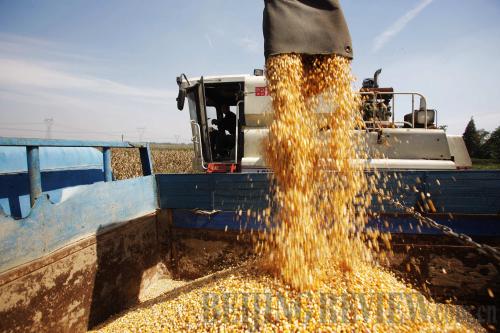|
 |
|
CORN IS NUMBER TWO: A combine harvests corn in Dangyang, Hubei Province. In China, corn is an important grain crop, second only to rice (WEN ZHENXIAO) |
Vilmorin Hong Kong Ltd. offers advantages in hybrid corn seeds, wheat seeds and oil-bearing plant seeds. In particular, it set up a seed institute in north China's Shanxi Province 10 years ago. Recently, corn seeds developed by the institute have received approval for sale.
Longping Hi-Tech has been seeking breakthroughs in corn seeds. Longping Hi-Tech and Vilmorin Hong Kong Ltd. have been discussing potential cooperation since 2005. Under the current agreement, the JV will mainly be engaged in the development, production and sale of hybrid corn seeds, which means Longping Hi-Tech will enter the corn seed industry.
The corn seed industry is recognized as offering the greatest opportunities for development among all seed industries, despite its fierce competition. The gross profit rate for corn seeds can reach 30 percent, or even 60 percent for some fine seeds, much higher than that of rice and other grain crop seeds, attracting various seed companies to enter this market.
Longping Hi-Tech is not the first to cooperate with foreign seed companies. A report released by the CIConsulting Research Center indicates several foreign seed companies have been seen in the Chinese market. In 2002, Pioneer Hi-Bred International, Inc., a Dupont business, established a JV with Shandong Denghai Seeds Co. Ltd.; four years later, it established another JV with Gansu Dunhuang Seeds Co. Ltd.
To stem worries international seed companies will dominate China's agricultural production and threaten the country's grain production security, the Chinese Government stipulates international seed companies must establish JVs with Chinese seed companies if they want to sell seeds. It also requires that the JVs be controlled by the Chinese party.
Other benefits
On February 10, Longping Hi-Tech announced a change in the ownership structure of its largest shareholders. According to the announcement, the first and second largest shareholders of Changsha Xindaxin Weimai Agriculture Co. Ltd.—Hunan Xindaxin Co. Ltd. and Vilmorin Hong Kong Ltd.—signed a stock ownership transfer agreement. Hunan Xindaxin Co. Ltd. agreed to acquire Vilmorin Hong Kong Ltd.'s 46.5 percent stake in Changsha Xindaxin Weimai Agriculture Co. Ltd.
Qiao Yang, an analyst with Changjiang Securities Co. Ltd., says since Hunan Xindaxin Co. Ltd. is the controlling shareholder of Longping Hi-Tech, after this transfer of stock ownership, Longping Hi-Tech will be changed from a Chinese-foreign JV into a domestic limited company.
According to Chinese Government policies, foreign-funded companies are not subject to the policies governing seed industries. Qiao says he thinks this ownership change is to go along with the supporting policies of seed industries to be issued by the Chinese Government.
The Ministry of Agriculture issued a set of draft management rules governing the seed industry on December 31, 2010. According to the rules, the minimum registered capital of hybrid rice and corn seed companies will be raised from the current amount of 5 million yuan ($758,725) to 30 million yuan ($4.55 million); the minimum registered capital of comprehensive seed companies will be raised from the current amount of 30 million yuan to 100 million yuan ($15.17 million). If the draft rules are implemented, it is estimated 90 percent of China's current 8,700 seed companies will be eliminated, with large-scale seed companies filling the vacuum.
"Longping Hi-Tech is grasping this opportunity to lay a foundation for entering the corn seed industry, creating great potential for the company's future development," Qiao said. | 